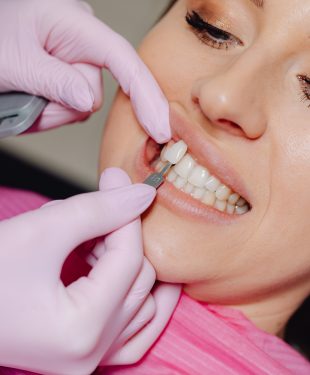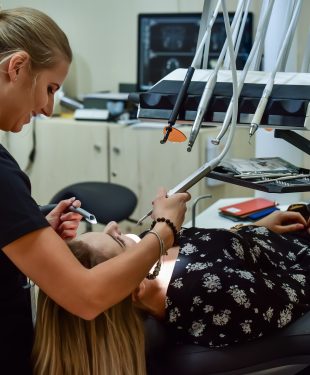
Improve Your Self-Confidence And Self-Esteem With These Non-Surgical Procedures
The relationship between physical appearance and self-confidence is so strong that many people would instead remain indoors and avoid interacting with others if they think they look poor. There are several aspects of physical appearance; the skin, clothes and shoes, and teeth. Many people with bad dentition or other dental issues often have low self-esteem and appear non-confident.
For most people with dental conditions, cosmetic dental care may involve surgical and non-surgical procedures; many prefer the latter unless the former is unavoidable. While surgical procedures are generally safe, non-surgical procedures have more appeal to many. If that’s your situation, you should know several ways to improve your confidence without going under the knife. Here are the top non-surgical procedures to help you improve your confidence and self-esteem.
Teeth Bleaching/Whitening

Photo by on Pexels
Stained and colored teeth are a common reason why many people feel less confident when they have to talk or smile publicly. Thankfully, fixing stained teeth does not typically require surgery. When you fix an appointment with your dentist to have your teeth whitened, you can relax knowing the procedure is painless and usually lasts less than an hour. The process involves using a chemical (typically hydrogen peroxide) to remove stains and prevent plaque buildup. There are three methods for teeth whitening; the procedure done by a dentist in the office, a dentist-supervised session at home, and using over-the-counter teeth whitening kits. Although they achieve good results, it is usually best to whiten teeth at a dental clinic for optimal results.
Teeth Alignment
Different teeth misalignments, such as underbite, present not only aesthetic issues but also cause physical pain and poor bite. Most teeth misalignments may not require dental surgery for correction. For example, your dentist can quickly fix your teeth with invisible aligners to help your smile. The procedure is straightforward; your dentist will first take an impression of your teeth and then send the impression to the lab to print a fitted aligner. Once the aligners are placed on the teeth, you begin your journey towards getting a better bite and brighter smile. Most teeth alignment takes anywhere from a few months to over a year, depending on misalignment. You can get more information from ALIGNERCO to know how aligners work and which is best for you. Your dentist should explain more about the procedures and help you choose the best option.
Simple Tooth Extraction
Many people associate tooth extraction with pain; while they are not entirely correct, tooth extraction is painless mainly during the procedure, and patients get painkillers to help them afterward. Non-surgical teeth extraction involves removing the bad tooth under local anesthesia without cutting into the gum. The dentist uses a pair of forceps and other equipment to hold the tooth and gently pull it out of the jaw. Patients generally feel no pain except for a slight dullness. Most people feel some discomfort after the anesthesia wears off, but dentists usually prescribe some OTC painkillers. Non-surgical tooth extraction can remove the bad tooth responsible for your poor smile so that you are back to eating your favorite meals with big smiles within a week.
Dental Veneers
Dental veneers are thin covers made from porcelain or resin placed over teeth for protection. Veneers protect teeth from stains and hot or cold foods and improve appearance. They are custom-made to fit each tooth and mimic the color reflection. Dental veneers are a good idea if you are worried about staining your newly whitened teeth. Veneers last between ten and thirty years with proper care and do not require special daily washing; your daily brushing routine is enough to keep them clean. Although they are durable, veneers are glass-like and subject to intense pressure. It is, therefore, important for heavy mechanical blows or biting too hard. Dental veneers are generally permanent but are replaceable.
Scaling And Root Planing
Sometimes, cosmetic dental procedures involve removing debris, plaque, and toxins that discolor teeth and cause diseases. Teeth scaling is a cleaning procedure for removing deep-seated plaque from gums and teeth. Plaque and debris tend to build up around the gum and along teeth. Over time, it may build up to levels where the teeth become prone to bacterial infection, discoloration, or decay. Your dentist could perform scaling to remove plaque and root planing to prevent plaque buildup. Root planing is a procedure to smoothen teeth surface; portions of the cementum and tartar are removed, giving the teeth a better look. Scaling and root planing are also done under local anesthesia and may cause some bleeding and swelling, which subside after a few days.
Laser Treatment
The use of laser technology in dentistry has improved many procedures and minimized surgical interventions. Laser is used for different purposes, ranging from teeth whitening to reshaping gums and killing bacteria. A laser can also remove growth (lesions) and reduce pain. A laser device produces focused heat and light to dissipate or cut through items. Laser treatments are usually painless and safe. There are two types of laser lights; soft and hard. A soft laser is used to reshape gums and whiten teeth, while a hard laser detects cavities and teeth filling and sometimes reduces teeth sensitivity.
Dental Crowns, Bridges, And Bonds
Dental crowns, bridges, and bonds help dental patients differently. Dental crowns are caps fixed on the teeth to protect them from damage, stains, and plaque. Crowns are made from gold, silver, or metal alloys and sometimes form part of bridges. A dental bridge is a prosthetic tooth that fills the space between teeth. Dental bonding is when dentists apply a resin material to the teeth and then carefully shape the material to fit the teeth. Dental crowns, bonds, and bridges can significantly improve dental aesthetics by filling out open spaces and protecting the gum and teeth.
Prescription Drugs
Drugs prescribed by dentists are necessary to maintain an excellent oral state and treat diseases without surgery. There are different types of medications for oral conditions and pain management. For example, your dentist may prescribe macrolide antibiotics for treating periodontitis. You may also get painkillers to manage post-dental pain, such as after removing a tooth. Some other dental medications are anti-inflammatory drugs, those for pain and anxiety, plaque control, and preventing tooth decay. It is necessary only to take medications prescribed by your dentist as self-medication could worsen whatever condition you have.
Reshaping And Contouring
Reshaping and contouring, also called Odontoplasty, describes the cosmetic and functional procedure for shaping teeth. Odontoplasty is another way to treat misaligned, broken, cracked, and overlapping teeth. Misaligned teeth cause uneven biting pressure, leading to painful chewing, loss of teeth, and toothaches. Your dentist can efficiently perform a reshaping and contouring procedure by chipping away parts of the enamel. The procedure is usually painless and quick. Sometimes, though, dentists may put the patient under local anesthesia if there is tooth sensitivity.
From teeth bleaching to laser treatments and prescription drugs, there are non-surgical dental treatments that will improve your confidence and boost your self-esteem. Despite your best efforts toward healthy teeth, you might have to book an appointment with your dentist to correct some issues. Infamy our dentist if you develop some discomfort with any procedure for prompt assistance.
